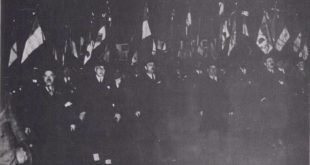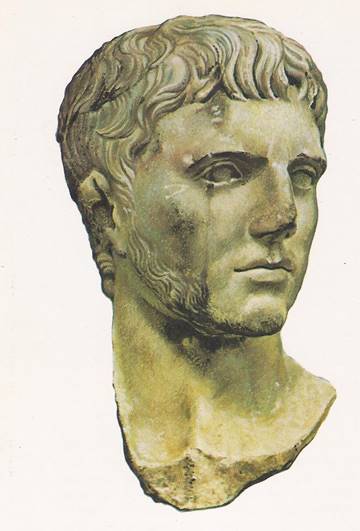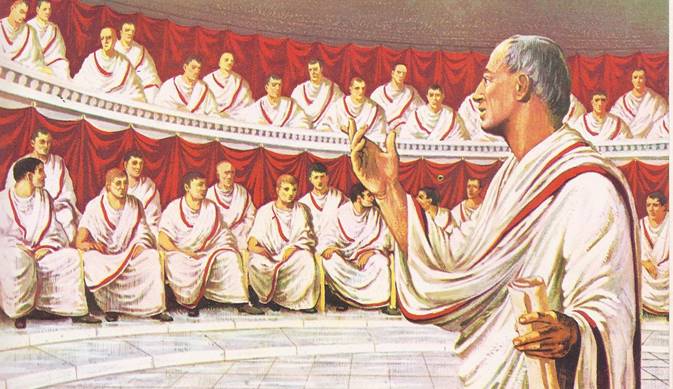Today we speak the words, “I am a World citizen,” with pride. To the people of the ancient world the statement, “I am a Roman citizen,” was a badge of high honour. Beginning as a small city state in Italy, Rome grew into a vigorous republic and finally into an empire so mighty that it included the whole of the Mediterranean world. Even after Rome’s grandeur had waned, its influence lived on among later peoples. Rome’s history is a reminder that the destiny of a nation rests more on the wisdom of its leaders and the character of its people than it does on military might and economic strength. Consider for a moment the two following scenes from Roman history. (1) The year is 216 B.C. It is a sad day in Rome. Word has just been brought of a great disaster. A Carthaginian general named Hannibal has invaded Italy and has just wiped out the Roman army that faced him. Rome’s allies are wavering in their loyalty. Some have already gone over to the enemy. An immediate attack on Rome is expected. Yet, the Senate (Rome’s council of state) refuses to give up hope and calls upon the citizens for fresh troops and supplies. It puts the city in a state of siege, or on the alert for final defense against destruction. It refuses to pay a ransom for Romans taken prisoners by the Carthaginians. When the Roman general who lost the battle returns with a handful of soldiers, he is not criticized. Instead, the Senate praises him for not giving up hope of saving the state. The confidence of the Senate was justified. Fifteen years later, it was Carthage and not Home that was conquered. In this crisis you see the Romans showing qualities which made them great: courage …
Read More »Democratic but Divided 1926-1939
UNLIKE Britain, France was not a highly industrialized country; its economy was fairly evenly divided between industry and farming. For this reason, the depression came to France later than it did to any of the democracies and its effect was less severe, but in no other democracy did communists and fascists play so large a part. For a time there was real danger that the French republic would be overthrown by the fascists and there were riots in the streets. One reason the fascists were so dangerous was that the French people were sharply divided in their political opinions. There were many parties of many political shades. The largest and most important was the Radical Socialist party, which was neither radical nor socialist. The name was something that had been left over from the past. It was a middle-of-the-road party, supported by the middle class and the farmers. To the left of the Radical Socialists were the Socialists, who had considerable strength and the Communists. On the extreme right were the anti-republic parties and the fascists. The most powerful of these was the Croix de Feu, the Cross of Fire. Made up mainly of war veterans, it was led by Colonel Francois de la Rocque and it won the support of a number of industrialists and financiers. Less strong, though still troublesome, were Action Francaise, Camelots du Roi, Solidarité Francaise‚ Jeunesse Patriote and the Cagoulards. Because of the number of parties, it was almost impossible for any one party to win a majority and control the government. France was governed by coalitions, or combinations, of two or more parties, which supported the premier, the head of the government. But disagreements often arose, and the parties were quick to withdraw their support of the premier. Whenever that happened, a new coalition …
Read More »Roosevelt Battles the Court 1937-1939
BEGINNING his second term, Roosevelt made it plain that the New Deal would go on. He would continue to work for reforms. He said in his second inaugural address: “In this nation I see tens of millions of its citizens — a substantial part of its whole population — who at this very moment are denied the greater part of what the very lowest standards of today call the necessities of life. “I see millions of families trying to live on incomes so meagre that the pall of family disaster hangs over them. “I see millions whose daily lives in city and on farm continue under conditions labelled indecent by so-called polite society of half a century ago. “I See millions denied education, recreation and the opportunity to better their lot and that of their children. “I see millions lacking the means to buy the products of farm and factory and by their poverty denying work and productiveness to many other millions. “I see one-third of a nation ill-housed, ill-clad, ill-nourished. . . . “It is not in despair that I paint for you that picture. I paint it for you in hope, because the nation, seeing and understanding the injustice in it, proposes to paint it out. We are determined to make every American citizen the subject of this country’s interest and concern and we will never regard any faithful law-abiding group within our borders as superfluous. The test of our progress is not whether we add more to the abundance of those who have much, it is whether we provide enough for those who have too little. . . .” DEFEAT IN THE SENATE To put through new reforms, Roosevelt felt that something had to be done about the Supreme Court. It had already blocked the NRA and …
Read More »After the Peace of Paris 1919 – 1920
DURING THE war, three great empires — the Russian, the Austro-Hungarian and the German –had vanished forever. Then, by the Treaty of Sévres, a fourth empire, the Ottoman, was quietly put to death. Turkey was confined to Asia Minor and became a republic. Of its former possessions, the League of Nations assigned Syria and Lebanon to France and Palestine and Iraq to Great Britain. Trans-Jordan and Saudi Arabia, which had fought the Turks under an adventurous British colonel named T. E. Lawrence, became independent kingdoms. In Europe, there were seven new states: Finland, Estonia, Latvia, Lithuania, Poland, Czechoslovakia and Yugoslavia. The first six, with Rumania, formed a zone that blocked Russian communism from spreading westward. Rumania had grown larger at the expense of Hungary, Russia and Greece at the expense of Turkey. Hungary and Austria were made small independent states, with no link between their governments. The South Slavs, who had triggered the crisis that brought on the war, saw their dream come true in a free, united Yugoslavia, but some Yugoslavs were still dissatisfied, for the Allies, in line with their secret treaty of 1915, had given Italy the port of Trieste and some islands on the Dalmatian coast of the Adriatic. Italy also received the Trentino and South Tyrol, former Austro-Hungarian lands. AMERICA AND THE LEAGUE Although the five treaties of the Peace of Paris changed the map of the world, it left more than one nation resentful and discontented. The Italians felt that the Allies had betrayed them by not giving them any of the German colonies. The Japanese felt cheated of their rightful gains in the Pacific and the Germans were particularly bitter, for they felt they had been unjustly treated in almost every way. When the peace conference began, they had expected that the Allies …
Read More »The Emperor’s City A. D. 14 to A. D. 117
GREAT power had allowed Augustus to do great good for Rome and its provinces. The same power in the hands of a man who was not good meant that he could do great harm. This the Romans learned as they watched the remarkable parade of good and evil men who came to govern Rome after Augustus. Some of them were wise, two or three were foolish, one thought he was the greatest artist in the world and another said he was a god. All were the masters of Rome, mighty princes who were called emperors. The title emperor came from imperator, the Roman name for the man who commanded the armies. Every ruler of the empire owed his power to the legions. When he gave an order, his soldiers made certain that it was obeyed. If his orders became too harsh to hear, it was his soldiers who struck him down. Augustus, like Caesar, had named the commander who would take his place when he died. The man he chose was one of his own family, the Caesars. So were the next three emperors. Two of these emperor Caesars were good and two were dreadfully bad. The first, Augustus’ stepson Tiberius, was good, though the city mob did not think so. He treated them with scorn and, worse, he was stingy with his gifts of food and gave them very few shows. The Senate liked him even less than the people did. Tiberius was proud and he made it difficult for them to pretend that they were ruling Rome. Then, one morning, someone overheard him exclaim, as he was leaving the Senate house, “These senators, how ready they are to be slaves!” The senators, who remembered Caesar as well as Augustus, began to plot against the emperor. But he brought …
Read More »The Second Triumvirate 43 B. C. – 30 B. C.
AS THE news of Caesar’s death spread through Rome, sorrow, anger and fear took hold of the city. On March 17, two days after the murder, the Senate met again. Cassius, Brutus and the other assassins took their usual places. There was no doubt that most of their fellow senators felt that they had done the right thing in ridding Rome of a tyrant, but Caesar’ s veterans were still in the city, taking their orders now from Marcus Aemilius Lepidus, who had been his Master of the Horse, the commander of the cavalry. Mark Antony was still consul, he had not yet said what he intended to do about Caesar’s murder, but certainly he would not forgive the killers.Of course, no one could tell what the mob might do. If the people took it into their heads to avenge the murder of their hero, there might be many more killings. So it was a cautious, quiet group of men who gathered in the Senate to discuss the death of Caesar and the future of Rome. When Mark Antony spoke, he surprised them by not demanding that the assassins be arrested and put on trial. Perhaps he was afraid that they had strong forces of their own or that he might be the next victim. Whatever his reasons were, he offered to make a bargain. He would agree to let the assassins go unpunished, if the Senate would agree to approve Caesar’s will and allow his friends to give him a proper, public funeral. To the senators, the terms sounded fair — better, in fact, than they had hoped for. They quickly agreed to their part of the bargain, ended the meeting and went home, congratulating themselves that it all had been so easy. THE FUNERAL OF CAESAR On the …
Read More »The City of Caesar 80 B. C. – 44 B. C.
THE story of Rome in the years after Sulla’s death was the story of a partnership of power. It was the tale of three men who bargained for the world — a rich man, a poor man and a man who was not only a hero, but looked it. The rich man was Crassus, who had become a millionaire by setting up the only fire department in Rome. The tall buildings and narrow, crowded streets of the city made a fire a constant danger. When one house burned to the ground, the buildings on either side were likely to fall over on top of it. The cry of “Fire!” roused fear in the hearts of men whose wealth was in the buildings they owned. It was the signal, too, for Crassus and his fire-fighting slaves to come on the run. While the slaves got their equipment ready and looked for water, Crassus found the landlord of the burning building and offered to buy it from him. The price he offered was not high, but it was more than the house would be worth after it had been destroyed by fire. If the landlord refused to sell, Crassus shrugged and let the fire burn. Usually, however, the landlord sold and the firemen went to work. When the fire was out, Crassus sent a crew of carpenters to repair the damage. He soon had a building as good as new and worth a great deal more than he had paid for it. If he had talked fast enough, he also owned the buildings next door, which did not even need repairing. Despite such dealings, Crassus was a popular man in the city. He was a good host. In politics, he took the side of the people and he greeted the poorest citizen …
Read More »The City Divided 130 B. C. – 70 B. C.
MARCUS TULLIUS CICERO, a young statesman known for his dramatic speeches, stood before a panel of judges in a courtroom in Rome. He stared at them angrily. For fifty days he had travelled through Sicily, collecting facts about the crimes committed by Caius Verres, the man who was on trial. Now the judges had told him that there would not be time to listen to his evidence. Cicero knew that the judges had been bribed. For it was no ordinary criminal that he meant to send to prison or to death. Caius Verres was an aristocrat and a senator and had served for three years as the governor of the province of Sicily. Verres’ lawyer was Hortensius, the leader of the aristocrats. Indeed, every rich or important man in Rome seemed to be supporting Verres, but Cicero was determined that this man should not escape judgment. He turned to Hortensius and offered to present his case in one day. “Would the court have time enough for that?” ‘ he asked sarcastically. Hortensius was surprised, but he smiled and told Cicero to try it if he liked. The judges agreed. For a moment there was silence in the courtroom, as Cicero turned to face the benches where the long lines of judges sat. Sternly he looked from man to man until he was certain all their eyes were on him. Then he began to speak. He listed Verres’ crimes: When he was governor and the commander of Rome’s army in Sicily, he had taken for himself the money raised to pay the troops. When he was governor and responsible for order and justice in the province, he had taken more money to allow pirates to rob the ports, to set criminals free and to condemn innocent men. For gold, he had …
Read More »







